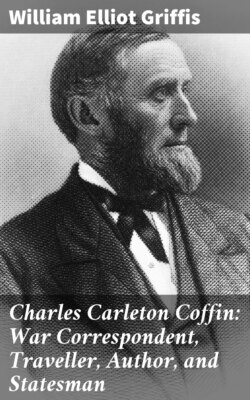Читать книгу Charles Carleton Coffin: War Correspondent, Traveller, Author, and Statesman - William Elliot Griffis - Страница 5
На сайте Литреса книга снята с продажи.
INTRODUCTION.
ОглавлениеTable of Contents
Charles Carleton Coffin had a face that helped one to believe in God. His whole life was an evidence of Christianity. His was a genial, sunny soul that cheered you. He was an originator and an organizer of happiness. He had no ambition to be rich. His investments were in giving others a start and helping them to win success and joy. He was a soldier of the pen and a knight of truth. He began the good warfare in boyhood. He laid down armor and weapons only on the day that he changed his world. His was a long and beautiful life, worth both the living and the telling. He loved both fact and truth so well that one need write only realities about him. He cared little for flattery, so we shall not flatter him. His own works praise him in the gates.
He had blue eyes that often twinkled with fun, for Mr. Coffin loved a joke. He was fond to his last day of wit, and could make quick repartee. None enjoyed American humor more than he. He pitied the person who could not see a joke until it was made into a diagram, with annotations. In spirit, he was a boy even after three score and ten. The young folks "lived in that mild and magnificent eye." Out of it came sympathy, kindness, helpfulness. We have seen those eyes flash with indignation. Scorn of wrong snapped in them. Before hypocrisy or oppression his glances were as mimic lightning.
We loved to hear that voice. If one that is low is "an excellent thing in woman," one that is rich and deep is becoming to a man. Mr. Coffin's tones were sweet to the ear, persuasive, inspiring. His voice moved men, his acts more.
His was a manly form. Broad-footed and full-boned, he stood nearly six feet high. He was alert, dignified, easily accessible, and responsive even to children. With him, acquaintanceship was quickly made, and friendship long preserved. Those who knew Charles Carleton Coffin respected, honored, loved him. His memory, in the perspective of time, is as our remembrance of his native New Hampshire hills, rugged, sublime, tonic in atmosphere, seat of perpetual beauty. So was he, a moral invigorant, the stimulator to noble action, the centre of spiritual charm.
Who was he, and what did he do that he should have his life-story told?
First of all, he was the noblest work of God, an honest man. Nothing higher than this. The New Hampshire country boy rose to one of the high places in the fourth estate. He became editor of one of Boston's leading daily newspapers. On the battle-field he saw the movements of the mightiest armies and navies ever gathered for combat. As a white lily among war correspondents, he was ever trusted. He not only informed, but he kept in cheer all New England during four years of strain. With his pen he made himself a master of English style. He was a poet, a musician, a traveller, a statesman, and, best of all and always, a Christian. He travelled around the globe, and then told the world's story of liberty and of the war that crushed slavery and state sovereignty and consolidated the Union. With his books he has educated a generation of American boys and girls in patriotism. He died without entering into old age, for he was always ready to entertain a new idea. Let us glance at his name and inheritance. He was well named, and ever appreciated his heritage. In his Christian, middle, and family name, is a suggestion. In each lies a story.
"Charles," as we say, is the Norman form of the old Teutonic Carl, meaning strong, valiant, commanding. The Hungarians named a king Carl.
"Carleton" is the ton or town of Carl or Charles.
"Coffin" in old English meant a cask, chest, casket, box of any kind.
The Latin Cophinum was usually a basket. When Wickliffe translated the Gospel, he rendered the verse at Matt. xiv. 20, "They took up of that which remained over of the broken pieces, twelve coffins full."
The name as a family name is still found in England, but all the Coffins in America are descended from Tristram Coffin, who sailed from Plymouth, England, in 1642, and in 1660 settled in Nantucket. The most ancient seat of the name and family of the Coffins in England is Portledge, in the parish of Alwington. To his house, and last earthly home, in Brookline, Mass., built under his own eye, and in which Charles Carleton Coffin died, he gave the name of Alwington.
"Carleton's" grandfather, Peter Coffin, married Rebecca Hazeltine, of Chester, N. H., whose ancestors had come from England to Salem, Mass., in 1637, and settled at Bradford. Carleton has told something of his ancestry and kin in his "History of Boscawen." In his later years, in the eighties of this century, at the repeated and urgent request of his wife, Carleton wrote out, or, rather, jotted down, some notes for the story of the earlier portion of his life. He was to have written a volume—had his wife succeeded, after due perseverance, in overcoming his modesty—entitled "Recollections of Seventy Years." To this, we, also, that is, the biographer and others, often urged him. It was not to be.
Excepting, then, these hastily jotted notes, Mr. Coffin never indicated, gave directions, or prepared materials for his biography. To the story of his life, as gathered from his own rough notes, intended for after-reference and elaboration, let us at once proceed, without further introduction.[Back to Content]
